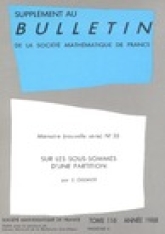Sur les sous-sommes d'une partition
On the subsums of a partition

- Consulter un extrait
- Année : 1988
- Tome : 35
- Format : Électronique, Papier
- Langue de l'ouvrage :
Français - Nb. de pages : 70
- ISBN : 2-85629-004-3
- ISSN : 0249-633-X
- DOI : 10.24033/msmf.336
Soit $\pi = (a_{1}, a_{2},\ldots,a_{s})$ une partition de l'entier $n = a_{1} + \cdots + a_{s}$. On appelle sous-somme de $\pi $ toute somme $ a_{{i}_{l}} + \cdots + a_{{i}_{t}}\ (i_{l} < \cdots < i_{t})$. Soit $\Sigma (\pi ) \subset [0,n]$ l'ensemble des sous-sommes de $\pi $. Le mémoire concerne $\Sigma (\pi )$. On étudie les 2 premières “composantes connexes” de $\Sigma (\pi )$, les partitions pour lesquelles $\Sigma (\pi )$ admet 1, 2 ou 3 composantes connexes, et les partitions telles que $\Sigma (\pi )$ soit assez dense dans $[n,0]$. Soit $Q$ un ensemble fini fixé d'entiers $>0$ ; soit $p(n,Q)$ le nombre de partition $\pi $ de $n$ telles que $Q \cap \Sigma (\pi ) = \emptyset $ ; on étudie le comportement asymptotique de $p(n;Q)$ quand $n \rightarrow \infty $ ; par exemple, $p (n; \{a\})/p(n) \sim (\pi / \sqrt {6})^{[a/2] + 1} u(a)/n^{([a/2] +1)/2}$ quand $n \rightarrow \infty $, où $u(a)$ est un entier tel que log $u(a) \sim (a/2)$ log $a$ quand $a \rightarrow \infty $. Pour $n$ grand, presque toute partition $\pi $ de $n$ telle que $\Sigma (\pi ) \cap \{1, 2, \ldots, a\} = \emptyset $ vérifie $\Sigma (\pi ) = \{a + 1, a + 2, a + 3,\ldots , n-a-1\}$.

